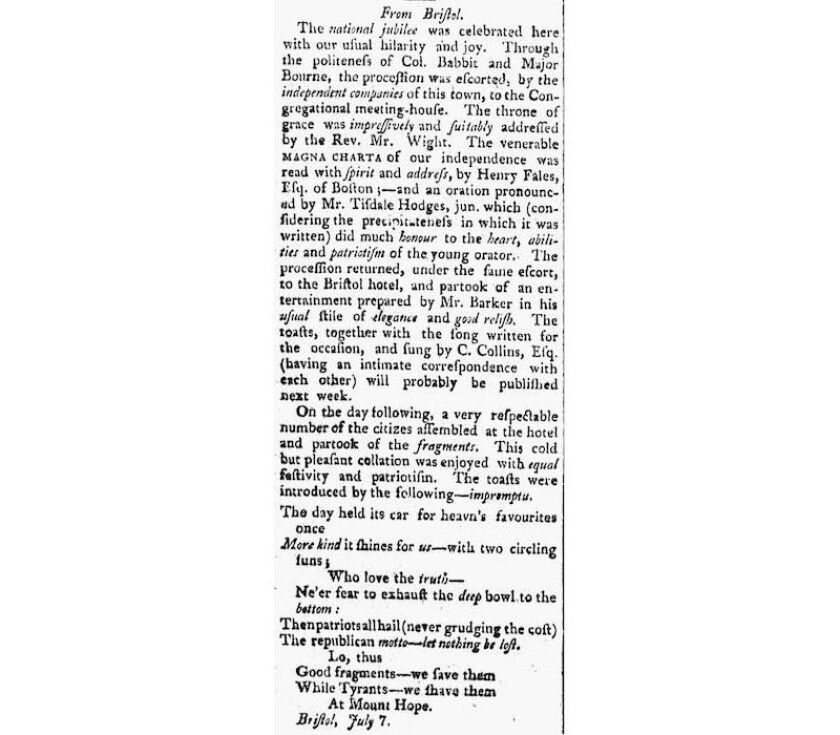In 1785, Reverend Henry Wight, a Congregational pastor and Revolutionary War veteran, conducted a series of religious services and speeches known as Patriotic Exercises to give prayer and thanks for the anniversary of the Declaration of Independence. While fewer than 20 people attended the original event, it quickly became an annual celebration that grew in popularity over the years.
Wight organized the exercises himself for the next 40 years, and they continued well beyond his involvement. Over the past two centuries, Bristol’s July Fourth celebration has expanded into a three-week affair, replete with concerts, dances, carnivals, pageants, and Orange Crate Derby races. Festivities now begin on Flag Day in June, and culminate in a two-and-a-half-mile parade on the Fourth of July — the “Military, Civic and Firemen’s Parade” — that runs through the center of Bristol. Because of the long legacy of this event, Bristol claims to have earned the nickname “The Most Patriotic Town in America.”

Beginning in the 1970s, the parade was marked with unique controversy. According to parade rules, only elected federal and state officeholders, as well as Bristol town officials, can march in the parade. While this officially excludes the mayor of Providence from marching, Mayor Buddy Cianci nonetheless participated in the parade for years, beginning with his first year as mayor in 1975. Known for his colorful personality, Cianci regularly joined in with great fanfare, often riding a horse through the parade while flanked by a large contingent of police.
Exasperated by his flamboyant presence and flouting of the parade’s rules, town officials in 1979 sent Cianci a letter forbidding him from participating in the 1980 parade. Cianci was running for governor of Rhode Island at the time, and his opponent, sitting governor Joseph Garrahy, was allowed to march. Knowing that the parade would bring publicity to Garrahy’s campaign, Cianci was determined to march as well.

Cianci continued to march in the parade, even during periods of political scandal. He marched in 1983, the year he was indicted on charges of assaulting, kidnapping and attempting to extort Raymond DeLeo, whom he accused of being romantically involved with his estranged wife. DeLeo, a Bristol resident, lived along the parade route. That year, Cianci simply marched past the house during the parade, although police were stationed at the house in anticipation of an altercation, according to Mike Stanton’s book, The Prince of Providence: The Rise and Fall of Buddy Cianci, America’s Most Notorious Mayor.
Cianci resigned from his position as mayor in 1984 due to his indictment, but was reelected in 1991. His contentious relationship with the Bristol parade organizers continued throughout his second tenure as mayor: he participated almost every year despite being unanimously disinvited in 1999 and despite having been indicted again (this time on federal corruption charges) in 2001.
His last appearance at the parade as mayor was in 2002, shortly before beginning his five-year jail sentence for a federal racketeering conspiracy, under the Racketeer Influenced and Corrupt Organizations Act statute (RICO). In his final parade march, friends of DeLeo taunted Cianci in front of DeLeo’s house, singing “For he’s a RICO felon” to the tune of “For He’s a Jolly Good Fellow.”
The Bristol Fourth of July celebration began as a religiously affiliated celebration of American independence and has become a celebration steeped in tradition and history. But the decades-long presence of controversial but charming local politician Buddy Cianci has given the patriotic event a unique combination of nostalgia and notoriety.









